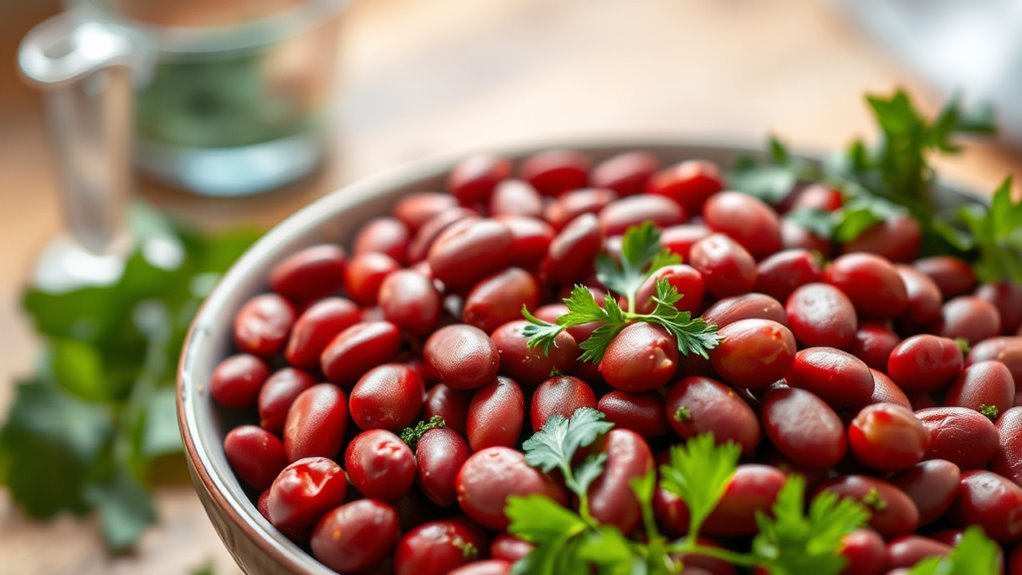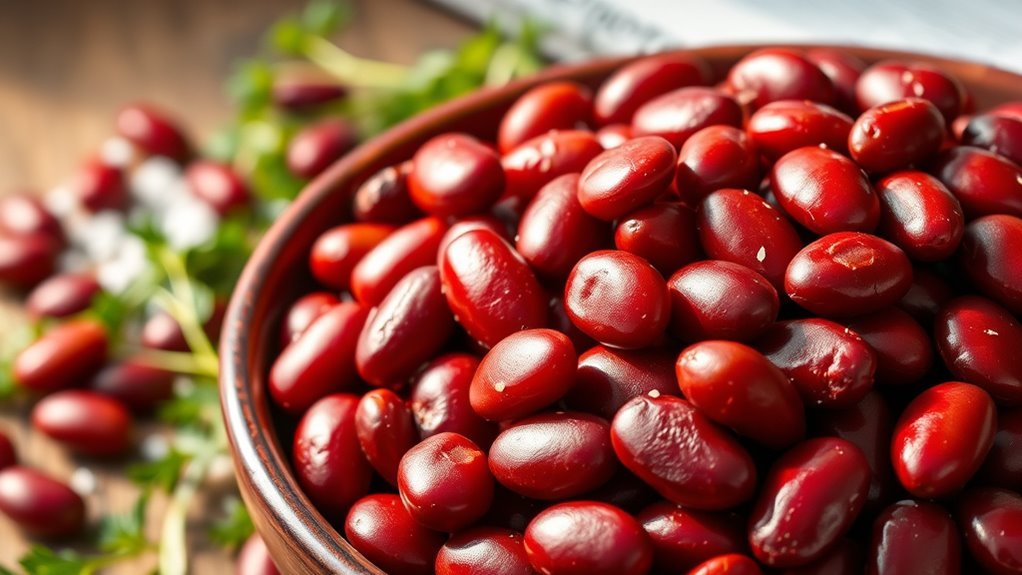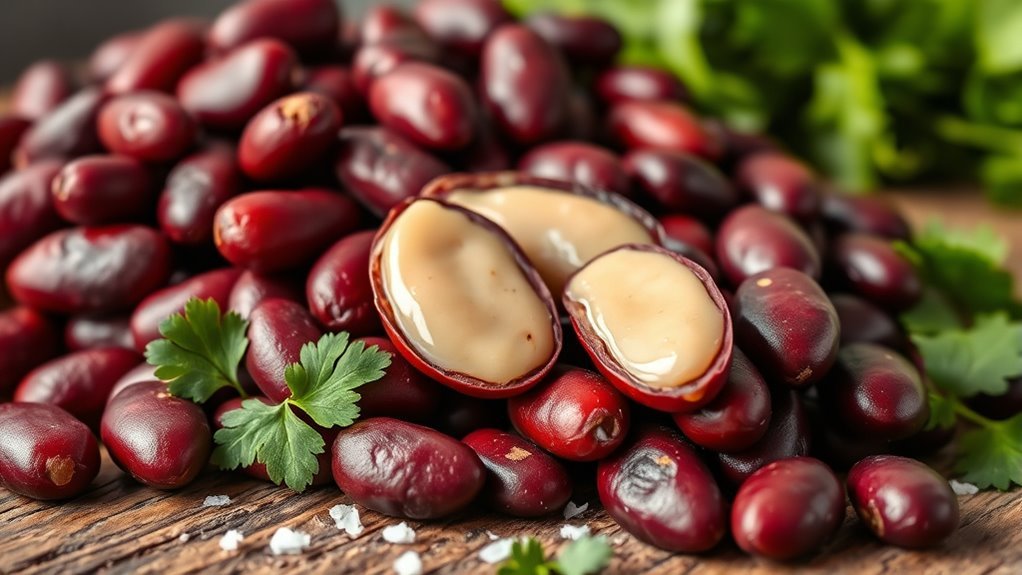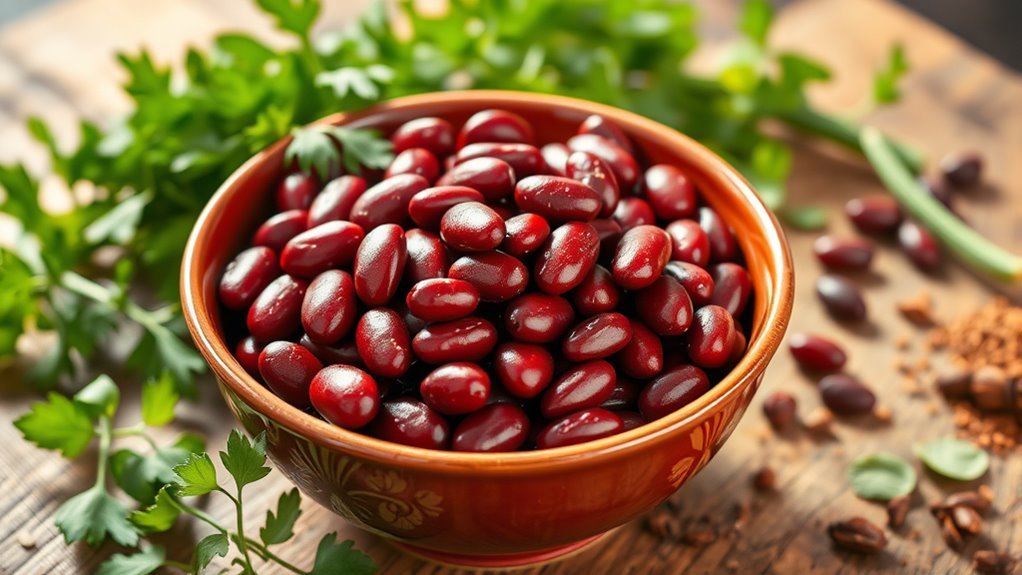Kidney beans aren’t keto-friendly due to their high carbohydrate content. One cup contains about 40 grams of carbs, which can easily exceed your daily limit on a ketogenic diet, preventing you from reaching ketosis. While kidney beans offer health benefits, including fiber and protein, strict keto followers should consider alternatives that have lower net carbs. If you’re looking for suitable options and creative meal ideas, check out what you can substitute for kidney beans.
Understanding the Ketogenic Diet

When you commence a ketogenic diet, your body undergoes a significant metabolic shift. This shift is guided by the ketogenic principles, primarily focusing on high-fat, moderate-protein, and low-carb intake. By adhering to carb restrictions, typically limiting your daily carb intake to about 20-50 grams, you force your body into a state of ketosis. In this state, your body burns fat for fuel instead of carbohydrates, leading to effective weight loss and improved energy levels. As you embrace this lifestyle, it’s essential to be aware of the foods you consume, ensuring they align with your dietary goals. Understanding these principles empowers you to make informed choices that foster freedom in your dietary journey, allowing you to thrive while enjoying delicious meals.
Nutritional Profile of Kidney Beans

When considering kidney beans, it’s crucial to understand their macronutrient breakdown and fiber content. These beans are rich in protein and carbohydrates, making them a significant source of energy. Additionally, their high fiber content can aid in digestion and contribute to overall health.
Macronutrient Breakdown
Kidney beans are a nutrient-rich food that can provide a significant macronutrient profile for those considering their dietary options. Each cup of cooked kidney beans contains about 15 grams of protein, making them a solid choice for building muscle while offering a moderate amount of carbohydrates, roughly 40 grams. This carbohydrate content is primarily complex, contributing to a stable energy release. Additionally, kidney beans boast around 0.5 grams of fat, helping maintain a favorable macronutrient balance. While they’re not typically seen as keto-friendly due to their carb content, they can be incorporated in moderation for those seeking variety. Understanding this macronutrient breakdown allows you to make informed choices about including kidney beans in your diet.
Fiber Content Analysis
A single cup of cooked kidney beans packs an impressive fiber content, offering about 13 grams per serving. This makes them one of the best fiber sources available, especially for those seeking plant-based options. Fiber is essential for maintaining a healthy digestive system, promoting regular bowel movements, and reducing the risk of constipation. Including kidney beans in your diet can enhance your overall digestive benefits, allowing you to feel full and satisfied longer. As you explore various food choices, consider how integrating kidney beans can contribute to your fiber intake while providing essential nutrients. Just remember to balance them with other low-carb foods if you’re following a ketogenic lifestyle. Enjoy the freedom of choosing nutritious options that support your health!
Carb Content of Kidney Beans

When evaluating kidney beans on a keto diet, you’ll want to pay attention to their carb count per serving. Typically, a half-cup of cooked kidney beans contains around 20 grams of carbohydrates, but calculating net carbs by subtracting fiber is essential for accurate tracking. In comparison to other beans, kidney beans can be higher in carbs, which may impact your keto goals.
Carb Count Per Serving
One cup of cooked kidney beans contains approximately 40 grams of carbohydrates, making them a significant source of carbs for those following a ketogenic diet. If you’re monitoring your carb intake closely, it’s essential to contemplate serving sizes when incorporating kidney beans into your meals. While they offer nutritional benefits like fiber and protein, their high carb count can hinder your progress on keto. You might want to explore other lower-carb sources if you’re aiming to maintain ketosis. Always remember that moderation is key; adjusting serving sizes can help balance your overall carb intake. Being mindful of how kidney beans fit into your diet can empower you to make informed decisions that align with your lifestyle choices.
Net Carbs Calculation
Calculating net carbs is vital for those on a ketogenic diet, especially when considering foods like kidney beans. To determine the net carbs, you’ll subtract fiber from the total carbohydrates. Kidney beans contain approximately 20 grams of carbs per cup, with around 6 grams of fiber. Using net carbs calculation methods, you’d find about 14 grams of net carbs per serving. This is important because exceeding your net carbs can greatly impact ketosis, the metabolic state you aim to achieve on keto. By understanding the net carb content, you can make informed decisions that align with your dietary goals while enjoying a variety of foods. Always remember to monitor your intake for best results.
Comparison With Other Beans
Although kidney beans are a popular choice in many dishes, their carbohydrate content can vary greatly when compared to other beans. For instance, while one cup of cooked kidney beans contains about 40 grams of carbs, black beans offer around 41 grams, and chickpeas have about 45 grams. If you’re looking for kidney bean alternatives that align better with a low-carb lifestyle, consider options like green beans or black soybeans, which are much lower in net carbs. A bean nutrition comparison reveals that these alternatives can provide similar protein and fiber benefits while keeping your carb intake in check. Ultimately, understanding these differences can help you make informed dietary choices.
Comparing Kidney Beans to Other Legumes
When comparing kidney beans to other legumes, it’s essential to evaluate their nutritional profiles, especially for those following specific diets like keto. Kidney beans have a moderate glycemic index and decent nutrient density, but how do they stack up against other legumes?
| Legume | Glycemic Index | Nutrient Density |
|---|---|---|
| Kidney Beans | 29 | High |
| Chickpeas | 28 | High |
| Lentils | 21 | Very High |
| Black Beans | 30 | High |
As you can see, kidney beans are comparable to chickpeas and black beans in glycemic index, but lentils offer even lower values. Understanding these differences can help you make informed choices while maneuvering your dietary preferences.
Health Benefits of Kidney Beans
Kidney beans offer a variety of health benefits that make them a valuable addition to many diets. Packed with plant protein, they provide essential amino acids that support muscle growth and repair. Their high fiber content promotes digestive health, helping you feel fuller for longer and aiding in regularity. The nutritional advantages of kidney beans extend to heart health, as they can help lower cholesterol levels and improve blood pressure. Additionally, their antioxidant properties contribute to disease prevention by combating oxidative stress in the body. By incorporating kidney beans into your meals, you’re not only enjoying a versatile ingredient but also enhancing your overall well-being. Embracing these benefits makes it easier to pursue a healthier lifestyle.
Potential Drawbacks of Consuming Kidney Beans on Keto
While kidney beans are nutritious, their high carbohydrate content can pose challenges for those following a ketogenic diet. One cup of cooked kidney beans contains about 40 grams of carbs, which greatly exceeds the daily carb limit for keto. This can hinder your ability to achieve ketosis, the metabolic state that drives fat burning. Additionally, kidney beans are often associated with digestive issues, like gas and bloating, which can complicate your keto journey. If you’re focused on maintaining low carb levels, the potential keto challenges of including kidney beans may outweigh their health benefits. Ultimately, if you’re committed to a strict keto lifestyle, you might want to reflect on alternative low-carb options that align better with your dietary goals.
Ways to Incorporate Kidney Beans Into a Keto Diet
If you’re looking to incorporate kidney beans into your keto diet, there are several creative ways to do so. You can explore low-carb recipe ideas, craft flavorful side dishes, and experiment with various bean salad variations. These options not only enhance your meals but also provide nutritional benefits while keeping your carb intake in check.
Low-Carb Recipe Ideas
Incorporating kidney beans into a keto diet may seem challenging due to their carbohydrate content, but with the right approach, you can enjoy their nutritional benefits. One great way is by making a low-carb chili. Substitute some of the beans with ground meat and low-carb vegetables to keep the carb count down while still enjoying a hearty meal. Another idea is a bean casserole; layer kidney beans with cheese, spices, and low-carb veggies for a comforting dish. You can also blend kidney beans into soups for added creaminess without the carbs of traditional thickeners. These recipes allow you to savor the flavors of kidney beans while aligning with your keto lifestyle. Enjoy the freedom to create!
Flavorful Side Dishes
Kidney beans can be a flavorful addition to your keto-friendly meals, especially as side dishes that complement your main courses. One great option is a spicy bean salad, which combines kidney beans with fresh vegetables, herbs, and zesty dressings. This dish not only adds a kick but also boosts your fiber intake. Alternatively, try a creamy bean dip made with kidney beans, avocado, and spices. This dip serves as a satisfying accompaniment to low-carb veggies or keto-friendly crackers. Both options provide essential nutrients while keeping you within your carb limits. Incorporating kidney beans in these ways can enhance your meals, giving you delicious, satisfying choices that align with your keto lifestyle.
Bean Salad Variations
While you might think beans are off-limits on a keto diet, there are creative ways to enjoy kidney beans without exceeding your carb intake. Consider making bean salad variations that balance flavors and nutrients. For instance, mix kidney beans with chopped cucumbers, bell peppers, and a light vinaigrette for a revitalizing dish. You can also add avocado and cilantro for a creamy texture and vibrant taste. If you’re feeling adventurous, blend kidney beans with lime juice, garlic, and spices to create a zesty bean dip. These creative combinations allow you to incorporate kidney beans into your meals, providing fiber and protein while keeping carbs in check. Enjoy the freedom of experimentation while staying on track with your keto goals!
Alternatives to Kidney Beans for a Low-Carb Diet
If you’re looking to maintain a low-carb diet but still want to enjoy the texture and flavor often associated with kidney beans, several alternatives can fit the bill. Black soybeans are a fantastic option, offering low carbs and high protein, along with numerous health benefits. If you’re in the mood for something different, consider chickpea alternatives like cauliflower or zucchini, which can mimic the texture while keeping carbs low.
Here’s a quick comparison of some alternatives:
| Alternative | Carbs per 100g |
|---|---|
| Black Soybeans | 1.6g |
| Cauliflower | 4.9g |
| Zucchini | 3.1g |
| Green Beans | 7.0g |
| Mushrooms | 3.3g |
Explore these options to keep your meals satisfying!
Recipes Featuring Kidney Beans for Keto Enthusiasts
For those who love the hearty texture and robust flavor of kidney beans, incorporating them into your keto meal plan can be a delicious challenge. While traditional kidney bean recipes may not be keto-friendly, you can still create satisfying dishes. Here are a few ideas to explore:
- Kidney Bean Chili: Use less kidney beans and add more low-carb veggies to balance the dish.
- Spicy Bean Dip: Blend kidney beans with spices and cream cheese for a tasty appetizer.
- Stuffed Peppers: Combine kidney beans with ground meat and cheese, then bake in bell peppers.
- Salads: Mix kidney beans with avocado, cilantro, and lime for a revitalizing side.
These recipes allow you to enjoy kidney beans with a keto twist while keeping your carb intake in check.
Final Thoughts on Kidney Beans and Keto Compatibility
Although kidney beans offer nutritional benefits, their compatibility with a keto diet requires careful consideration. The health implications of consuming kidney beans while on keto can be significant due to their higher carbohydrate content. If you’re looking for a low-carb lifestyle, you’ll need to weigh these dietary considerations carefully.
| Nutritional Aspect | Kidney Beans |
|---|---|
| Carbohydrates | 20g per 100g |
| Fiber | 6g per 100g |
| Protein | 9g per 100g |
Ultimately, while kidney beans can fit into a balanced diet, their inclusion in a keto plan might hinder your goals. If you’re committed to keto, you might want to explore lower-carb alternatives that align better with your dietary needs.
Frequently Asked Questions
Can Kidney Beans Kick Me Out of Ketosis?
Kidney beans can impact your ketosis, especially if you consume them in large amounts. They’re higher in carbs compared to many keto-friendly foods, with about 20 grams of carbs per cup. If you’re aiming for strict ketosis, even a moderate portion might kick you out. It’s essential to monitor your carb intake and consider alternatives that align better with your dietary goals. Always balance your meals to maintain that desired state of ketosis.
How Do Kidney Beans Affect Blood Sugar Levels?
Kidney beans can impact your blood sugar levels due to their carbohydrate content. When consumed, they cause a moderate insulin response, which helps regulate glucose levels. Their fiber content slows down digestion, leading to a more gradual rise in blood sugar compared to refined carbs. This means that if you enjoy kidney beans, you might experience a steadier energy level without drastic spikes in insulin, promoting a more balanced approach to your diet.
Are Canned Kidney Beans Keto-Friendly?
When it comes to canned kidney beans, think of them as a double-edged sword on the keto diet. While they’re a convenient source of protein and fiber, their carbohydrate content can be a challenge. A typical serving contains around 20 grams of carbs, which might push you over your daily limit. If you’re aiming for ketosis, moderation is key; consider pairing them with low-carb veggies to keep your meal in balance.
What Portion Size of Kidney Beans Is Acceptable on Keto?
When you’re considering portion size, it’s essential to practice portion control with kidney beans. A typical serving size is about ½ cup, which contains roughly 20 grams of carbohydrates. If you’re aiming for a strict keto diet, you’ll want to limit your intake to stay within your daily carb limit. Remember, moderation is key; you can enjoy kidney beans occasionally, just be mindful of how they fit into your overall meal plan.
Do Kidney Beans Have Any Hidden Carbs?
Ever wondered if those kidney beans are hiding extra carbs? When you check their nutritional profile, you’ll find they contain around 20 grams of carbohydrates per cup. However, this isn’t necessarily a bad thing; it’s all about portion control. While kidney beans do have carbs, understanding their carbohydrate content helps you manage your intake effectively. So, if you’re mindful, you can enjoy them without derailing your dietary goals.
1. Are kidney beans considered keto-friendly?
No, kidney beans are not typically considered keto-friendly. The ketogenic diet is characterized by very low carbohydrate intake, usually around 20 to 50 grams of net carbs per day. A standard serving of kidney beans contains approximately 20 grams of carbohydrates, which can take up a significant portion of your daily carb allowance on a keto diet. Therefore, while kidney beans are nutritious, they are generally not suitable for a strict ketogenic lifestyle.
2. What are the carbohydrate contents of kidney beans?
A 1-cup serving of cooked kidney beans contains about 40 grams of total carbohydrates, with around 13 grams of dietary fiber. This results in approximately 27 grams of net carbs (total carbs minus fiber). Given that the keto diet aims for low net carb consumption, kidney beans can quickly exceed the daily limit for many individuals following this diet.
3. Are there keto-friendly alternatives to kidney beans?
Yes, there are several keto-friendly alternatives to kidney beans. Options such as black soybeans, green beans, and cauliflower can be great substitutes. Black soybeans, in particular, are lower in carbs and high in protein, making them a popular choice for those on a ketogenic diet. You can also use vegetables like zucchini or mushrooms to create bean-like dishes while keeping the carb count low.
4. Can kidney beans fit into a low-carb diet?
Kidney beans can fit into a low-carb diet, but it depends on your specific carb goals. If you are following a more flexible low-carb diet that allows for 50-100 grams of carbs per day, you might be able to include a small portion of kidney beans. However, if you are strictly adhering to a ketogenic diet, it’s better to avoid them due to their higher carbohydrate content.
5. What are the health benefits of kidney beans?
Kidney beans are packed with nutrients and offer several health benefits. They are an excellent source of protein, dietary fiber, and essential vitamins and minerals, including iron, potassium, and folate. The high fiber content can aid in digestion and help regulate blood sugar levels. Additionally, kidney beans have antioxidants that may help reduce inflammation and lower the risk of chronic diseases. While they may not fit into a strict keto diet, incorporating them into a balanced diet can contribute to overall health.
References
- https://www.ncbi.nlm.nih.gov/pmc/articles/PMC7071238/
- https://www.healthline.com/nutrition/keto-diet-food-list
- https://www.webmd.com/diet/obesity/ss/slideshow-keto-diet-foods
- https://www.verywellfit.com/keto-diet-foods-5118440
- https://www.health.harvard.edu/staying-healthy/the-keto-diet
- https://www.mayoclinic.org/healthy-lifestyle/nutrition-and-healthy-eating/expert-answers/keto-diet/faq-20449362
- https://www.medicalnewstoday.com/articles/319825


